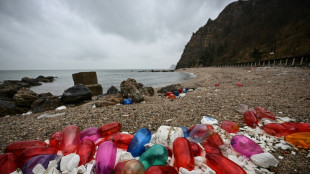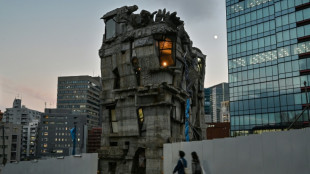
-
 Hezbollah under pressure after war with Israel
Hezbollah under pressure after war with Israel
-
OPEC+ postpones meeting on oil output to December 5

-
 Zelensky slams Russia's 'despicable' use of cluster munitions in energy strikes
Zelensky slams Russia's 'despicable' use of cluster munitions in energy strikes
-
One dead, thousands displaced as floods hit southern Thailand

-
 Lebanon army deploys under Israel-Hezbollah ceasefire
Lebanon army deploys under Israel-Hezbollah ceasefire
-
Imran Khan's wife Bushra Bibi emerges as Pakistan protest figure

-
 COP16 biodiversity talks to restart in February: UN
COP16 biodiversity talks to restart in February: UN
-
Iran to hold nuclear talks with three European powers

-
 French govt ready for budget concessions to avoid financial 'storm'
French govt ready for budget concessions to avoid financial 'storm'
-
Hong Kong airport third runway takes off

-
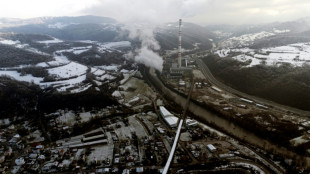 In Bosnia, the path to renewables runs through its coal mines
In Bosnia, the path to renewables runs through its coal mines
-
China probes top military official for corruption

-
 Syria war monitor says more than 130 dead in army-jihadist clashes
Syria war monitor says more than 130 dead in army-jihadist clashes
-
China says top military official Miao Hua under investigation

-
 Taiwan president's plan to stop over in Hawaii, Guam angers Beijing
Taiwan president's plan to stop over in Hawaii, Guam angers Beijing
-
Russian attacks leave one million Ukrainians without power

-
 Markets mixed after subdued pre-holiday shift on Wall St
Markets mixed after subdued pre-holiday shift on Wall St
-
What would an ICC arrest warrant for Myanmar's junta chief mean?

-
 China says top military official Miao Hua suspended, under investigation
China says top military official Miao Hua suspended, under investigation
-
Taiwan's Lai to stop over in Hawaii, Guam during Pacific trip

-
 Namibia extends voting after logistical issues
Namibia extends voting after logistical issues
-
LIV Golf's Herbert in charge at Australian Open, Smith two back

-
 Despair in Sweden as gangs recruit kids as contract killers
Despair in Sweden as gangs recruit kids as contract killers
-
Russia launches massive aerial attack on Ukraine's energy sector

-
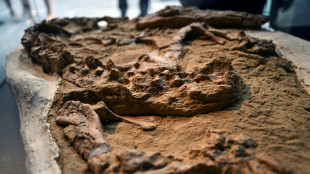 Peru scientists unveil crocodile fossil up to 12 million years old
Peru scientists unveil crocodile fossil up to 12 million years old
-
At plastic treaty talks, no united front for industry

-
 Williamson falls for 93 as England fight back in first Test
Williamson falls for 93 as England fight back in first Test
-
South Korea officials say three dead in heavy snowfall
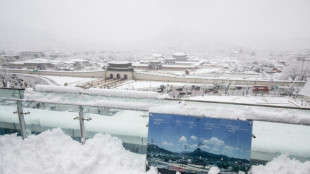
-
 High-flying Fiorentina face test of Scudetto credentials with Inter visit
High-flying Fiorentina face test of Scudetto credentials with Inter visit
-
Verstappen switches focus to re-boot defence of F1 teams' title

-
 UK filmmaker Richard Curtis makes first foray into animation
UK filmmaker Richard Curtis makes first foray into animation
-
Countrywide air alert in Ukraine due to missile threat

-
 China's military corruption crackdown explained
China's military corruption crackdown explained
-
Primark boss defends practices as budget fashion brand eyes expansion

-
 Williamson eyes ton as New Zealand take control against England
Williamson eyes ton as New Zealand take control against England
-
Norway faces WWF in court over deep sea mining

-
 Trump, Sheinbaum discuss migration in Mexico amid tariff threat
Trump, Sheinbaum discuss migration in Mexico amid tariff threat
-
Asian markets mixed after subdued pre-holiday shift on Wall St

-
 Orban's soft power shines as Hungary hosts Israeli match
Orban's soft power shines as Hungary hosts Israeli match
-
'Retaliate': Trump tariff talk spurs global jitters, preparations

-
 'Anti-woke' Americans hail death of DEI as another domino topples
'Anti-woke' Americans hail death of DEI as another domino topples
-
Trump hails migration talks with Mexico president

-
 Truckers strike accusing Wagner of driver death in Central African Republic
Truckers strike accusing Wagner of driver death in Central African Republic
-
London police say 90 victims identified in new Al-Fayed probe

-
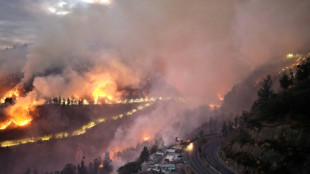 Air pollution from fires linked to 1.5 million deaths a year
Air pollution from fires linked to 1.5 million deaths a year
-
Latham falls for 47 as New Zealand 104-2 in first England Test

-
 US tells Ukraine to lower conscription age to 18
US tells Ukraine to lower conscription age to 18
-
Judge denies Sean Combs bail: court order

-
 Suarez extends Inter Miami stay with new deal
Suarez extends Inter Miami stay with new deal
-
Perfect Liverpool on top of Champions League, Dortmund also among winners


The painstaking task of identifying WWI dead
At least 600,000 soldiers who died in France during the First World War are still officially missing, their resting places unknown and unmarked.
While the passage of time renders the task of recovering the lost war dead increasingly complex, it is still possible to identify a few of the fallen.
The first step to is to determine whether discovered remains are really those of a soldier from WWI.
Researchers use the state of the remains and scraps of uniform or equipment to check that the skeleton doesn't date from an earlier period or is evidence of a crime scene.
Then they try to ascertain the soldier's nationality.
"The best sources of proof are metal-reinforced leather boots, which preserve well and are different depending on the country," said Stephan Naji, head of the recovery unit at Commonwealth War Graves Commission (CWGC).
His team in the Calais region of northern France is regularly contacted when remains are discovered.
- Buttons, boots and badges -
Soldiers who are uncontestably French or German are handed over to France's War Veteran's Office (ONAC) or Germany's VDK war graves agency.
"If there's a military plaque with a name of it and proof of next of kin, the soldier's descendants can repatriate him to his family home or they can let the state bury him in a national cemetery," said ONAC's Stephane Jocquel.
DNA tests are seldom carried out on the remains of French combatants.
One of the CWGC's missions is to help the authorities identify as many as possible of the 100,000 soldiers from the former British Empire who are still missing.
Buttons and insignia from uniforms are key clues, as are regiment badges as well as water bottles or whistles bearing the name of the soldier's unit.
But all the tell-tale signs need to tally. Some soldiers swapped badges as a sign of comradeship or recovered equipment from fallen brothers in arms.
Australian boots, for example, were particularly prized for their quality.
- 'Known unto God' -
Investigators also clean personal items, like razors, forks and watches, for fine details like the owner's engraved initials or a hallmark indicating the date and place the object was made.
If they can confirm the soldier's nationality, they pass on the information to the country's authorities, who cross check it with their lists of missing combatants.
Some countries, including Australia, Britain and Canada, carry out genealogical research to try to trace descendants, including DNA tests if any are found.
The search can take several years and is successful in only about two to three percent of cases, according to Alain Jacques, head of the archaeology service in Arras, northern France.
If a soldier is successfully identified, his remains are buried with military honours at the nearest Commonwealth cemetery, in the presence of descendants who wish to attend.
When the soldier cannot be identified, he is reburied with honours under a gravestone bearing the words "Known unto God".
The epitaph was chosen by British poet Rudyard Kipling, who spent years fruitlessly searching for his own son after he went missing, aged 18, in what would be called the war to end all wars.
I.Meyer--BTB


